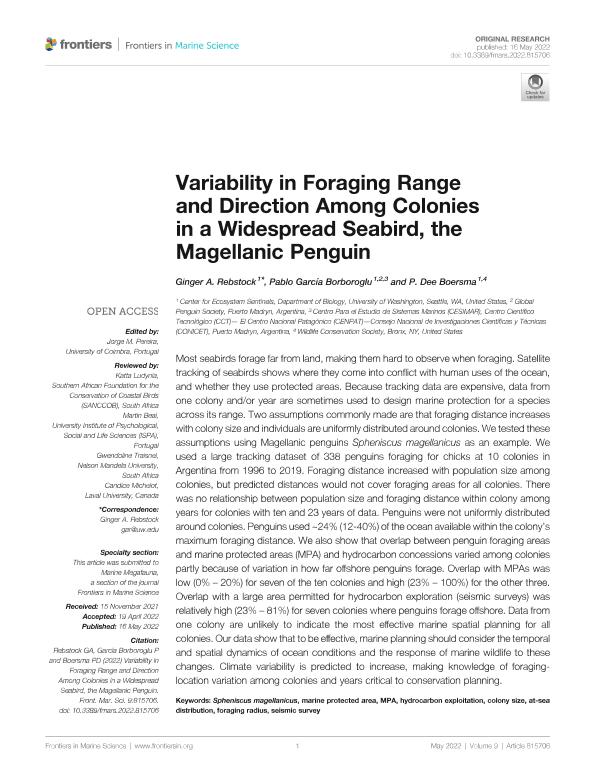Mostrar el registro sencillo del ítem
dc.contributor.author
Rebstock, Ginger A.

dc.contributor.author
Garcia Borboroglu, Jorge Pablo

dc.contributor.author
Boersma, P. Dee

dc.date.available
2023-07-27T12:55:19Z
dc.date.issued
2022-05
dc.identifier.citation
Rebstock, Ginger A.; Garcia Borboroglu, Jorge Pablo; Boersma, P. Dee; Variability in Foraging Range and Direction Among Colonies in a Widespread Seabird, the Magellanic Penguin; Frontiers Media; Frontiers In Marine Science; 9; 5-2022; 1-15
dc.identifier.issn
2296-7745
dc.identifier.uri
http://hdl.handle.net/11336/205779
dc.description.abstract
Most seabirds forage far from land, making them hard to observe when foraging. Satellite tracking of seabirds shows where they come into conflict with human uses of the ocean, and whether they use protected areas. Because tracking data are expensive, data from one colony and/or year are sometimes used to design marine protection for a species across its range. Two assumptions commonly made are that foraging distance increases with colony size and individuals are uniformly distributed around colonies. We tested these assumptions using Magellanic penguins Spheniscus magellanicus as an example. We used a large tracking dataset of 338 penguins foraging for chicks at 10 colonies in Argentina from 1996 to 2019. Foraging distance increased with population size among colonies, but predicted distances would not cover foraging areas for all colonies. There was no relationship between population size and foraging distance within colony among years for colonies with ten and 23 years of data. Penguins were not uniformly distributed around colonies. Penguins used ~24% (12-40%) of the ocean available within the colony’s maximum foraging distance. We also show that overlap between penguin foraging areas and marine protected areas (MPA) and hydrocarbon concessions varied among colonies partly because of variation in how far offshore penguins forage. Overlap with MPAs was low (0% – 20%) for seven of the ten colonies and high (23% – 100%) for the other three. Overlap with a large area permitted for hydrocarbon exploration (seismic surveys) was relatively high (23% – 81%) for seven colonies where penguins forage offshore. Data from one colony are unlikely to indicate the most effective marine spatial planning for all colonies. Our data show that to be effective, marine planning should consider the temporal and spatial dynamics of ocean conditions and the response of marine wildlife to these changes. Climate variability is predicted to increase, making knowledge of foraging-location variation among colonies and years critical to conservation planning.
dc.format
application/pdf
dc.language.iso
eng
dc.publisher
Frontiers Media

dc.rights
info:eu-repo/semantics/openAccess
dc.rights.uri
https://creativecommons.org/licenses/by/2.5/ar/
dc.subject
AT-SEA DISTRIBUTION
dc.subject
COLONY SIZE
dc.subject
FORAGING RADIUS
dc.subject
HYDROCARBON EXPLOITATION
dc.subject
MARINE PROTECTED AREA
dc.subject
MPA
dc.subject
SEISMIC SURVEY
dc.subject
SPHENISCUS MAGELLANICUS
dc.subject.classification
Ecología

dc.subject.classification
Ciencias Biológicas

dc.subject.classification
CIENCIAS NATURALES Y EXACTAS

dc.subject.classification
Conservación de la Biodiversidad

dc.subject.classification
Ciencias Biológicas

dc.subject.classification
CIENCIAS NATURALES Y EXACTAS

dc.title
Variability in Foraging Range and Direction Among Colonies in a Widespread Seabird, the Magellanic Penguin
dc.type
info:eu-repo/semantics/article
dc.type
info:ar-repo/semantics/artículo
dc.type
info:eu-repo/semantics/publishedVersion
dc.date.updated
2023-07-10T10:45:04Z
dc.journal.volume
9
dc.journal.pagination
1-15
dc.journal.pais
Suiza

dc.description.fil
Fil: Rebstock, Ginger A.. University of Washington; Estados Unidos
dc.description.fil
Fil: Garcia Borboroglu, Jorge Pablo. Consejo Nacional de Investigaciones Científicas y Técnicas. Centro Científico Tecnológico Conicet - Centro Nacional Patagónico. Centro para el Estudio de Sistemas Marinos; Argentina. University of Washington; Estados Unidos. Global Penguin Society; Argentina
dc.description.fil
Fil: Boersma, P. Dee. University of Washington; Estados Unidos. Wildlife Conservation Society; Estados Unidos
dc.journal.title
Frontiers In Marine Science

dc.relation.alternativeid
info:eu-repo/semantics/altIdentifier/url/https://www.frontiersin.org/articles/10.3389/fmars.2022.815706/full
dc.relation.alternativeid
info:eu-repo/semantics/altIdentifier/doi/https://doi.org/10.3389/fmars.2022.815706
Archivos asociados
